
Experiential Learning | Research & Innovation | Community Impact | Career Preparation | Teaching Excellence | 21st Century Liberal Arts | Building Community | Good Vibes | CAS Spotlights | All Stories | Past Issues
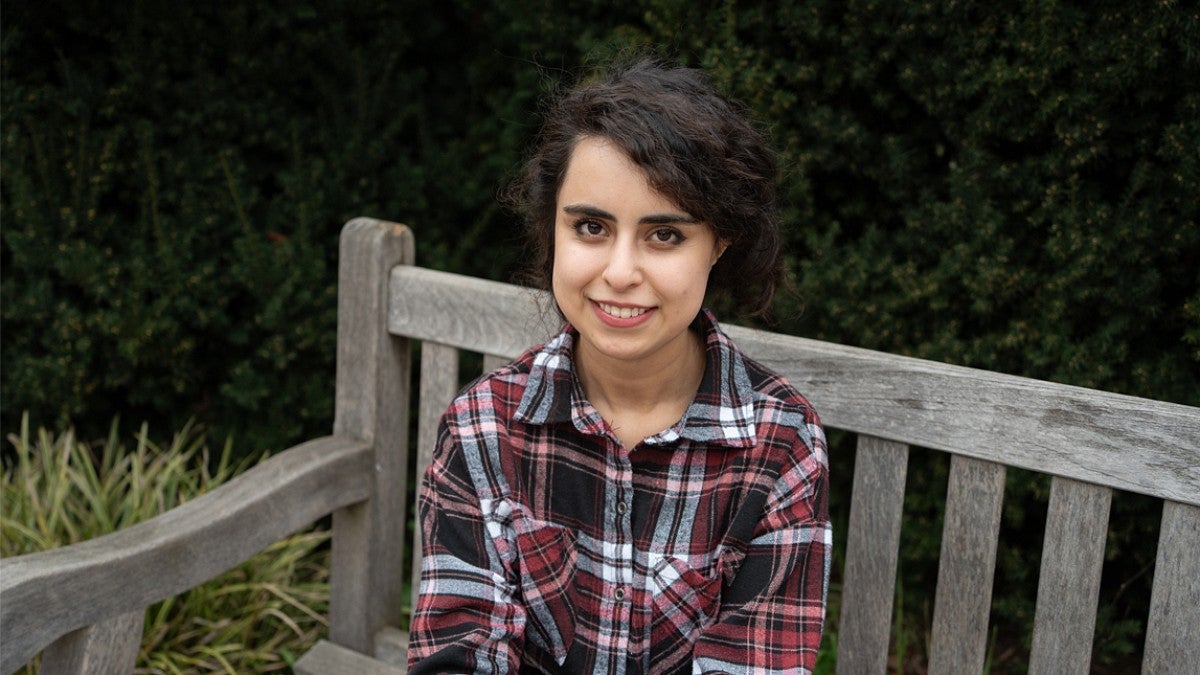
February 28, 2024
Battling to Learn
When Saghar Salehi joined Afghanistan’s first all-girls robotics team six years ago, her classmates and neighbors warned her against it.
“We were girls, we were doing science, we were building robots. It was all strange for people to think about,” says the 19-year-old computer science major. “I wanted to fight the idea that engineering and computer science were only for boys."
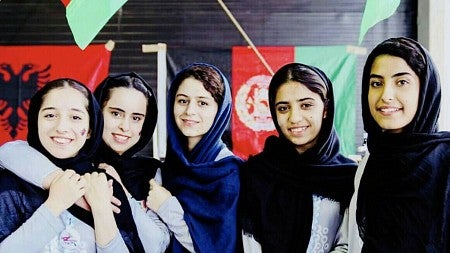
Known as the Afghan Dreamers, the team made international headlines in 2017 when they were denied visas to attend the FIRST (For Inspiration and Recognition of Science and Technology) Global Challenge robotics competition in Washington, DC. Gathering support—and numerous visas—they captured the world’s attention as they traveled the globe for the next four years, testing their mettle in robotics competitions and vocally advocating for women’s education.
But just when the Afghan Dreamers began to feel unstoppable, the Taliban seized power in Afghanistan, toppling the country’s democracy.
Less than a month later, Salehi was fleeing for her life—narrowly escaping first to Pakistan and eventually to Mexico—before finding a new home studying software engineering in the University of Oregon’s College of Arts and Sciences.
We are trying to prove the Taliban wrong," Salehi says, "that women can go for their dreams and achieve their goals.
The rise to fame
Salehi was born in Herat during a golden era for Afghan women.
Between 2001 and 2018, enrollment at all education levels increased tenfold, and the number of girls in primary school rose from virtually zero to 2.5 million, according to UNESCO. By August 2021, four out of 10 primary students were girls.
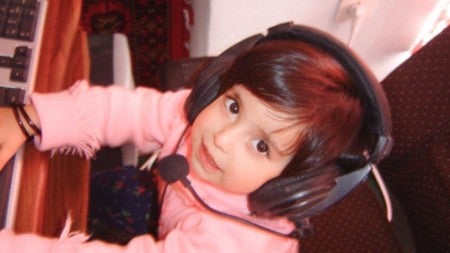
At age 5, Salehi was already captivated by technology and began using her brother’s computer for up to 5 hours a day. “It was a magic box for me,” she says.
Although women still weren’t allowed to study STEM majors at university or leave the country without a male chaperone, Salehi developed her English skills by reading computer science textbooks, which weren’t available in the Farsi language.
At age 14, she became one of six girls chosen from around the country to join an all-girls robotics team sponsored by the Digital Citizen Fund, a nonprofit founded by an Afghan American woman to support female entrepreneurs.
The girls began building robots and quickly saw the potential of robotics to improve the lives of people in their country. They wanted to design robots that would extract delicate saffron threads from the stigmas of crocus flowers to make the process easier for women, who perform 80% of the harvesting work in Afghanistan. They also discussed building low-cost ventilators out of used car parts at the height of a regional COVID outbreak.
“Our projects tried to solve problems that our country was experiencing,” Salehi says.
When their visas for the FIRST Global competition in Washington, DC were denied, they refused to admit defeat. Sarah Porter, founder of the global AI community InspiredMinds, lobbied on their behalf. It took multiple attempts and a petition signed by 53 members of Congress to gain them entry to the US—a battle that received global attention.
“We were all just jumping and shouting and hugging and crying,” Salehi recalls. “We realized it was proof that we should never give up.”
They returned from the competition with a Courageous Achievement award in hand, and TV news was at the airport to greet them. The Afghan ambassador to the US even came to welcome them home.
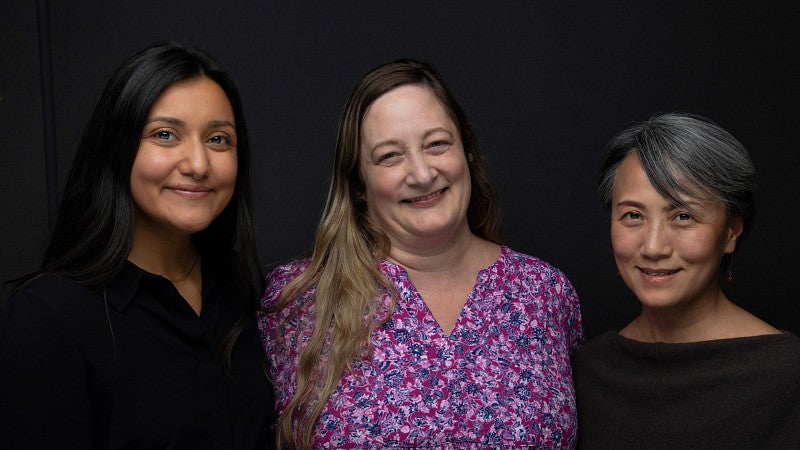
People were having a change in perspective. They were now proud of us,” Salehi says. “Bringing home a medal, waving the Afghan flag—people saw it as a national honor, and we were representing the country. Girls across Afghanistan now wanted to be part of the team.
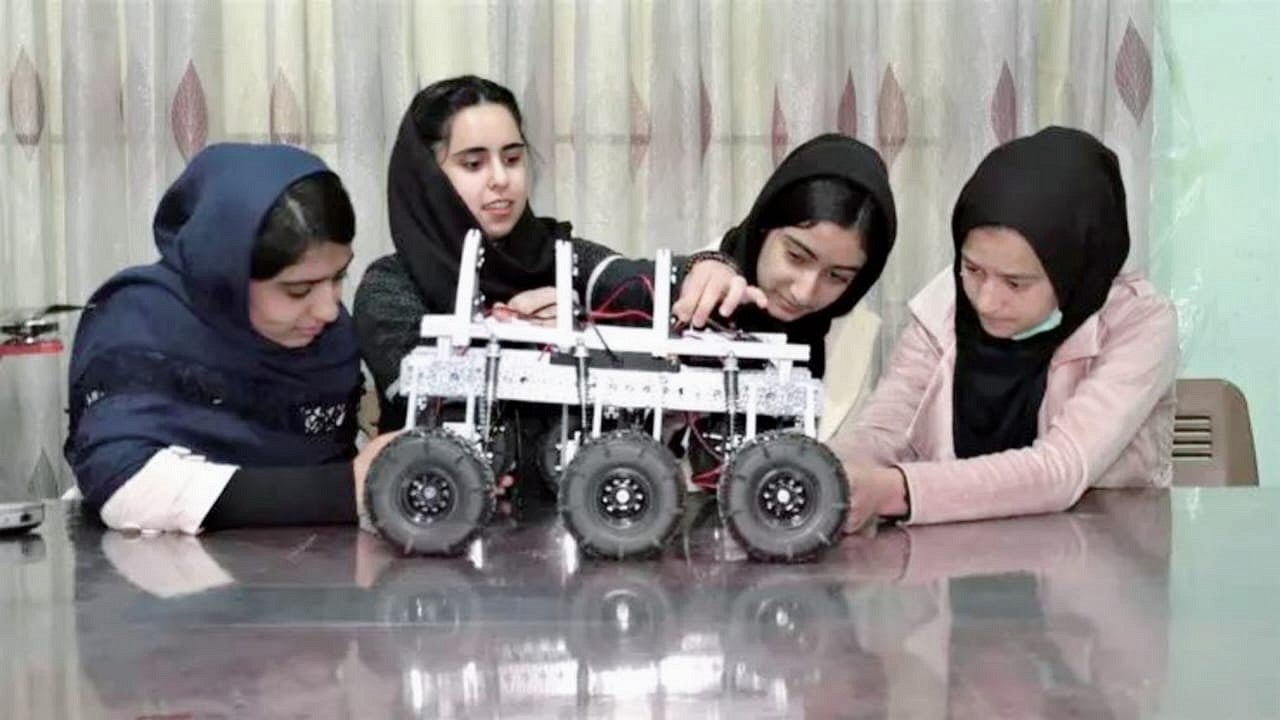
From freedom to fear
The Afghan Dreamers traveled to more than 40 countries, competing in robotics tournaments, speaking at events such as the United Nations General Assembly, and drawing international media attention. Porter raised support to fly them to take the stage at the World Summit AI in Amsterdam.
They began holding weekly robotics workshops for girls in Kabul and Herat, teaching the basics to nearly 600 girls each year. In 2019, they met with Afghan President Ashraf Ghani to discuss building a STEM school in Kabul where women could study the subjects that had previously been denied to them.
Their mission—to change the world’s perception of Afghanistan from a war-torn country to a thriving hub for technological advancement—was the subject of a 2022 documentary, Afghan Dreamers.
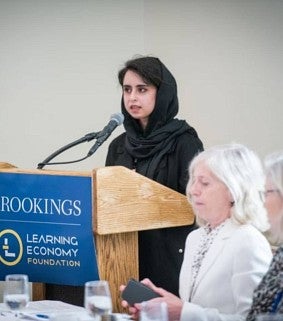
“We are the new generation,” Salehi says. “We are the generation of technology. We don’t use guns, we use technology for achieving our goals.”
But while the team won award after award abroad, violence was brewing back home.
As US peace talks with the Taliban proceeded, insurgent attacks were killing thousands. Suicide bombings devastated the team, and one of the members lost her father in an attack.
Salehi and her teammates grew anxious about the commute to their robotics workshop, located in a rural area just outside Herat.
“I could see how frightened they were, how dazzled by everything that was happening,” Porter says.
When the Taliban began seizing control of the country in 2021, they circulated photos of the Afghan Dreamers, along with threats of punishment against the girls for pursuing an education.
“We were physically scared for our lives,” Salehi says. "Everything we had done in our whole lives became very dark. We were worried about the safety of our families.”
In the months before Kabul fell, several members of the team reached out to Porter for help.
“I got Twitter messages from Saghar and other members of team saying, ‘Our lives are in danger. Please can you help us?’ ” Porter says. “As we all know, the fall of Kabul was atrocious and happened very quickly. Then I got another message from them saying, ‘We’re going to die.’ ”
Porter rallied more than 300 volunteers from the InspiredMinds global community and raised funds to help the team flee to safety, a journey that took months to complete.
“When they said goodbye to their families in Herat, they thought they were saying goodbye forever,” Porter says. “They were told to pack only what they could carry, so they took a suitcase each and left."
Thinking of it still makes Salehi cry.
“It was the most difficult time in my whole life,” she says. “All I could do was hug my mom. I was crying so hard. We knew we had to leave our country forever.”

The lesson I have learned from this entire situation is that you cannot expect someone else to take action. The bravest people I have borne witness to were and still are the women and girls of Afghanistan—girls of Saghar's age and younger who are risking their lives against a barbaric regime with immense courage, fighting for their freedom and basic human rights.
We can all learn from these girls, but more so we can all take courage ourselves from their actions and do so much more to ensure justice prevails for the girls of Afghanistan. I am certainly not forgetting them.
Starting a new chapter at UO
Reza Rejaie, professor and head of the UO Department of Computer Science, first learned about Salehi through an appeal for help from InspiredMinds on Twitter.
After meeting up with her family in Mexico, she had made it safely to the US, spending 30 days in a refugee camp in Virginia. She desperately wanted to earn her undergraduate degree but couldn’t get financial aid because of her refugee status.
“When I heard about her story, it really resonated with me, both as a department head and as a father. It became my mission to bring her here,” says Rejaie, who spent the next year securing funding support from multiple sources, including the UO Office of Financial Aid and the Rotary Club of Portland. Combined with additional support from InspiredMinds, it was enough to fund her first year at UO.
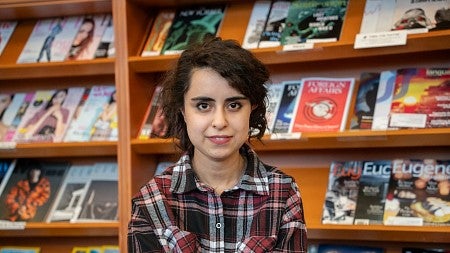
“Despite everything she has gone through, and despite her inability to go back to her country, she’s still committed to making things better for the girls she left behind,” Rejaie says. “Welcoming someone to our campus who has had such diverse, unique and difficult experiences is an asset that will enrich all of us. To meet someone like her and learn about all she has been through is inspiring.”
When Rejaie reached out to say the UO would be happy to welcome her, “I started jumping up and down,” Salehi says. “I was so happy that I could finally get my education.”
Salehi, who began classes during winter term this year, plans to get a PhD in computer science and help other Afghan women by developing software that will allow them access to education. And she still harbors dreams of creating an online STEM school.
“Girls back home are now banned from education,” she says. “My goal is to help them continue their education even if the Taliban is banning them. I want to be the voice for my fellow women. I want to advocate for their rights in the US.”
This term, Salehi is taking classes in math, computer science and philosophy. While she enjoys all of her classes, philosophy has helped her process the journey she has been on since leaving Afghanistan.
“I’ve felt I am lost many times on this path,” she says. “When you’re an immigrant and you go to a whole new country, you get culture shock. Philosophy can help you find yourself in the world. It can help you find your purpose.”
A computer scientist to the core, however, she views the world as a robot she’s trying to program.
“We face programming errors, and life is exactly the same,” she says. “Once you have the experience and become a good programmer, you can handle the errors and obstacles in life and go for your dreams and achieve them."
Since leaving Afghanistan, Salehi has been relentless in her studies, Porter says.
“She will work harder than anybody else living or breathing. She wants this more than anything,” Porter says. “Right now, she’s focused on her studies, but when she focuses her full attention on the people who are still in Afghanistan, she’s going to be unstoppable. She will change the world."
Salehi’s parents, now living in the Bay Area, have been supportive of her dreams from the beginning. Her mom often tells her how proud they are of her. But success hasn’t come without a cost.
“I don’t feel I am 19,” she says. “I feel I am 40. It’s been a lot to digest. And it was a lot of life experience in a short time.”
Now that she’s come this far, she’s confident she can make a difference for other women in her home country who are oppressed by Taliban rule.
“Every day I wake up, I feel so grateful. I feel so energized. I will never take this for granted,” Salehi says. "I believe education and technology can help me achieve my goals for girls in my country.”
—Nicole Krueger, BA ’99 (journalism), is a communications coordinator for the College of Arts and Sciences.
—Cathy Kralik, senior director of communications for the College of Arts and Sciences, contributed to this article.
